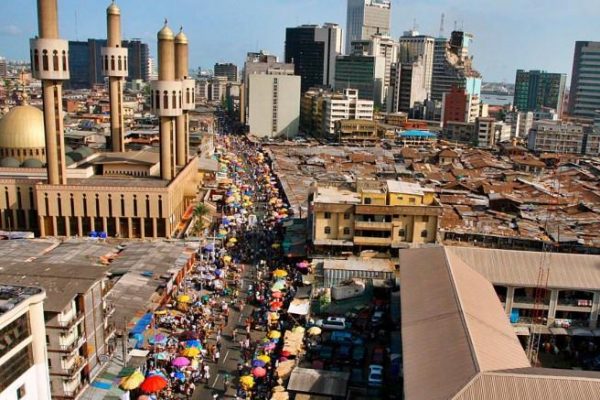Facilitating Non-Oil Export To Salvage Nigeria’s Economy

By Kenneth Jukpor
At independence, non-oil export was responsible for 93.3% of Nigeria’s total foreign earnings. However, the nation abandoned agriculture to face crude oil. Since then, the emphasis on agriculture and agro-export dwindled.
Today, the nation’s non-oil export including agriculture is less than 20% showing the neglect of agriculture but the opportunities are still there.
Following the devastating economic effects of COVID-19 pandemic in Nigeria which also crippled global crude oil prices; the Federal Government intends to facilitate the non-oil export sector to salvage the nation’s economy.
Prior to the pandemic, Nigeria recorded significant improvement in non-oil export which doubled from about N1 trillion to N2 trillion from 2018 to 2019, an indication that the President Muhammadu Buhari administration prioritizes non-oil export.
While this strong performance in the external sector suggests increasing diversification of exports and export revenue, the economic reality facing the nation following the significant drop in global crude oil prices currently at $30 per barrel means that non-oil export must be given more preference and support to stabilize the nation’s economy.
Recall that the nation’s initial 2020 budget titled, “Budget of Sustaining Growth and Job Creation”, was premised on a benchmark price of $57 per barrel for the sale of crude oil, daily oil production capacity of 2.18 million barrels and exchange rate of N305 to $1.
While the emphasis on daily oil production has dwindled with no takers for Nigeria’s crude, the exchange rate has exceeded N400 per dollar and oil revenue anticipated from crude oil sale has become a pipe dream, indicating that non-oil export is the nation’s best bet to attain economic sustenance.
Speaking with maritime journalists last week, the Executive Secretary of Nigerian Shippers’ Council (NSC), Mr. Hassan Bello revealed that the Federal Government is intensifying efforts to boost export and creating a value chain that that would refine the products before exporting.
Noting the effects of the COVID-19 pandemic on the nation’s economy, Bello said; “We need to look inward and export is very important. Export is going to be our main line now because import is going to trickle down because there are lots of disruptions in the international supply chain. Even China will not export what it used to export; they will like to keep it for domestic use.”
On the need for port operations for support export, the Shippers’ Council boss lamented that about 800 trucks carrying perishable goods for export were stuck as they were denied entry into the terminals until the Shippers Council had to intervene recently.
“There were about 800 trucks outside some terminals but Shippers’ Council has brokered with the terminals and now these trucks are going in. We want these exports to be evacuated because some of these exports are perishable and we cannot afford to have them on the roads.”
He opined that there was need to enhance the port processes and procedures to facilitate export, noting that a new export strategic committee has been instituted which comprise NSC, Nigerian Ports Authority (NPA), Nigerian Export Promotion Council (NEPC), Nigerian Customs Service (NCS), Central Bank of Nigeria (CBN), among others.
The NSC boss also posited that there is a need to have a virtual port so that operations can be seamless and people don’t have to be present at the ports to take delivery of cargoes.
On his part, the Chief Executive Officer, Institute of Export Operations and Management (IEOM), Mr. Ofon Udofia highlighted inter-agency collaboration as one of the key requirements to facilitate Nigeria’s non-oil exports.
His words: “I’m happy with the level of collaboration at the seaport today with Shippers’ Council collaborating with NPA, the Council for the Regulation of Freight Forwarding in Nigeria (CRFFN), NEPC, Nigerian Maritime Administration and Safety Agency (NIMASA) and others under the Maritime Task Team. This synergy among government agencies should be stronger.”
“NSC should be able to checkmate shipping lines to curb outrageous shipping fees. NPA should also work with terminal operators to create export bays. Such export bays would assist export of products like sesame seed and cashewnuts, especially for people would don’t have warehouses. People should be able to move such products to the export bays where Customs and other agents would be present while the container is stuffed.”
Udofia also admonished the Federal Government to address the gap in knowledge with regards exporting and exportable products.
“Farmers should be encouraged to have the global standards in their minds whether they are producing for local consumption or for export. This engagement should be a bottom-top approach to get people at the grassroots better understand the issues.”
He commended NEPC for establishing state export committees, even as he urged the agency to ensure these committees remain functional.
“Each state should have a functional export committee and possibly take it down to the local government centres. People should get necessary information and sensitization from these centres and information from such level can be taken to the State Ministry of Commerce before it gets to NEPC. Each local government in Nigeria can be known for one exportable item and within a short period of time we can transform the nation with exports,” he opined.
Udofia also admonished Customs to support export, noting that export is said to be free whereas exporters pay unreceipted money to Customs to stamp their export documents.
He added that freight agents also have to be efficiently trained on export processes, admonishing CRFFN to continue its commendable efforts by positioning freight forwarders for export.
Also speaking on the available opportunities for non-oil export from Nigeria, the Director General of Multimix Academy, Dr. Obiora Madu described agro-export as a more reliable business venture than crude oil.
“Even during the lockdown as a result of the COVID-19 pandemic agro export continued. There was a shipment of yam few days ago from Lagos International airport via Ethopian airline. During the previous week, another batch of yam produce was exported via British Airways. Food business would always be lucrative as long as people remain on the earth because they always eat and require food to survive,” he said.
Dr. Madu who was speaking during an Live Conversation series with MaritimeTVNews last week, lamented crude oil has made Nigerians lazy and turned the citizens into short term business people.
His words: “Exporting is a process and not just a transaction; that is why people who are in haste ought to look for something else to do. You also need to study to be successful in export business. It’s not a venture you rush into because you hear it is profitable otherwise you would rush out and at that time you will be doing so without your money.”
He stressed that agro export could earn Nigeria huge foreign exchange and provide massive employment teeming youth and help diversify the nation’s economy. However, he warned that agro-export business required patience to study the technicalities and peculiarities of the various agro produce.
While noting that the nation could maximize its advantage as one of the largest producers of products like cocoa and yam, Dr. Madu admonished exporters to add value before exporting.
According to him, the processing of the nation’s agro produce would provide enormous job opportunities for Nigerians; while exporting raw materials was equivalent to exporting job opportunities.
He also noted that agro processing would help eliminate the challenges associated with the moisture, temperature and colour of primary agro produce which sometimes devalue the products or see them rejected after export.
Meanwhile, speaking from the point of view of a freight forwarder, the President of National Association of Government Approved Freight Forwarders (NAGAFF) Chief Increase Uche said that freight agents are essential service providers tasked with operating in an environment which lacks essential infrastructure.
Highlighting top challenges to export in Nigeria, he said: “The infrastructure to facilitate the movement of these exports is nothing to write home about. Human capacity development is also needed because there are areas that freight forwarders need to update and work with counterparts even as the issue of continental free trade comes up. There is need for training that would see freight forwarders in the country measure up with what is required, especially for exports.”
The NAGAFF President admonished the government to re-introduce the initiative of export grants to support existing exporters and encourage others to venture into manufacturing or agro produce exports.
Beyond reviving the economic difficulties caused by the COVID-19 pandemic, the African Continental Free Trade Agreement (AfCFTA) heralds an era were imports into member countries of the African Union will need to become more scrutinized.
Exporting from Nigeria would have to be seamless if Nigeria intends to optimize the gains of AfCFTA. An efficient port environment, improved transport infrastructure, fiscal incentives, human capacity and requisite sensitization would have to be luxuriantly available to facilitate non-oil export to salvage Nigeria’s economy.
Nigeria can be set for a new economic era, and one with loads of economic gains; but the work would have to start now, not later.








